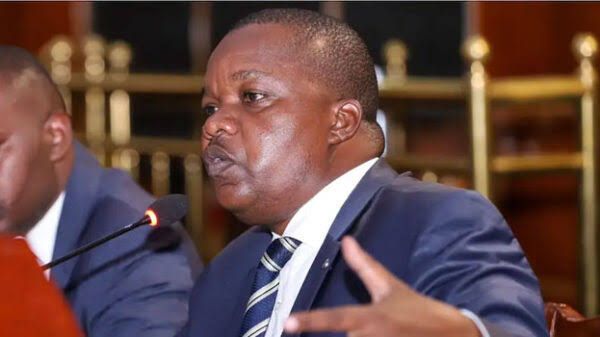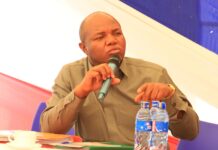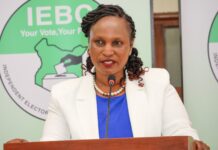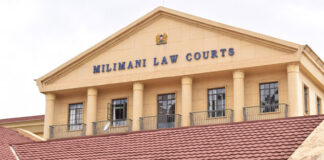A recent statement by Kitui East Member of Parliament Nimrod Mbai has ignited a heated national conversation on constitutional freedoms and political tolerance, following his warning against criticizing President William Ruto within his constituency.
Speaking during Madaraka Day celebrations on June 1, MP Mbai made remarks perceived by many as a veiled threat to suppress dissenting political views. While addressing residents, the lawmaker cautioned political opponents and supporters of rival leaders to exercise restraint during campaigns, especially when referencing the Head of State.
“We will not allow anyone to abuse William Ruto in Kitui East,” Mbai stated. “Those looking for votes to contest against William Ruto should do so without insulting him. For those who would want to, we can allow you. You have the freedom of speech, but we will not assure you of your freedom after speech.”
The statement quickly reverberated across the country, drawing sharp criticism from civil society organizations, legal experts, and opposition leaders who argue that it threatens the constitutional right to freedom of expression as enshrined in Article 33 of the Kenyan Constitution.
Burial Chaos Precedes Controversial Remarks
Mbai’s comments came just a day after a burial ceremony in Kitui East descended into chaos. During the event, a woman was interrupted mid-speech as she expressed support for Wiper party leader Kalonzo Musyoka, declaring her belief that he would win the 2027 General Election.
“I have no fear saying that Kalonzo Musyoka will win in the 2027 General Election…,” the woman said before four men approached, attempting to forcibly take the microphone from her. The incident sparked a confrontation among mourners, prompting police to intervene and restore order.
Eyewitnesses at the scene noted that tensions had been high even before the disruption, and many interpreted the incident as part of a growing pattern of political intolerance in the region.
Constitutional Concerns Raised
Legal analysts have expressed alarm over the implications of MP Mbai’s remarks, viewing them as an affront to Kenya’s democratic principles.
“Freedom of expression is a cornerstone of any democratic society,” said constitutional lawyer Martha Kamende. “Threatening people with consequences for what they say—especially in political discourse—runs counter to the letter and spirit of our Constitution.”
Article 33 of the 2010 Constitution guarantees every individual the right to freedom of expression, including the freedom to seek, receive, or impart information or ideas of any kind. While the same article outlines that this right does not extend to hate speech or incitement to violence, it firmly protects political speech.
Political Reactions
Opposition leaders have condemned Mbai’s remarks, accusing him of promoting fear and undermining national unity. Wiper party officials have demanded an apology and called on relevant authorities to investigate the threats implied in his speech.
“The intimidation of citizens simply for expressing support for their preferred candidates is unacceptable,” said Wiper Party Secretary-General Shakila Abdalla. “Elected leaders should be the first to protect, not threaten, constitutional freedoms.”
Human rights organizations, including Amnesty International Kenya, have also voiced concern. In a statement, the group urged political leaders to respect the freedoms enshrined in the Constitution and to foster an environment where diverse political opinions can be expressed without fear.
Mbai Defends Position
In response to the backlash, MP Mbai has stood by his comments, insisting that he was merely advocating for civility and respect in political discourse.
“I didn’t say people can’t speak. I said they should avoid insults and keep campaigns issue-based,” he told a local radio station on Tuesday. “President Ruto deserves respect as the Head of State. That’s all I meant.”
However, critics argue that his phrase “no freedom after speech” carries an ominous tone, historically associated with authoritarian regimes where dissent is criminalized.
Call for Dialogue and Tolerance
As the country gears up for the 2027 elections, the episode underscores the growing need for leaders to uphold democratic values, particularly at the grassroots level where political polarization is intensifying.
Civic educators and religious leaders in Kitui have called for open forums to promote peace and political tolerance, warning that failure to address inflammatory rhetoric could erode trust in democratic institutions.
“Kenya must never return to a place where fear silences the people,” said Bishop David Mwangangi of the Kitui Interfaith Council. “Our freedom was hard-won and must be guarded fiercely by both citizens and leaders alike.”
As the debate unfolds, Kenyans are reminded that the strength of their democracy lies not only in the right to vote, but in the ability to speak freely, without fear of retaliation.
Written By Rodney Mbua



















